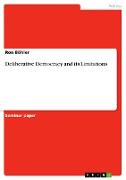Deliberative Democracy and its Limitations
BücherAngebote / Angebote:
Seminar paper from the year 2010 in the subject Politics - Political Theory and the History of Ideas Journal, grade: 1.7, University of Bath, language: English, abstract: This essay examines deliberative democracy in recent theories and its limitations in reality. It starts by defining the term deliberative democracy along its own normative standards. Furthermore, the societal and political context in which deliberation as a form of governance by the people arose will be broached. The second section then addresses major shortcomings of deliberative thoughts, both theoretically and empirically.There is a huge difference between normative aspirations of deliberation theory on the one hand, and empirical evidence on the other. A prerequisite and similarity among all deliberative forms nevertheless is the existence of a lively public sphere, which guarantees communicative acting as well as the free exchange of information and opinions.The emergence and rise of deliberation brought forth both sympathizers and sceptics. While its proponents regarded deliberation as a solution to de-politicizing societies and people¿s disenchantment with politics, the latter ones remained pessimistic about the adaptability of the concept in practice.In theory, it seemed to be beyond question that deliberation would do better in terms of citizens¿ participation, legitimacy and accountability of the political outcome than its representative counterparts in Western societies. The idea was to give back an active role to the public in the process of policy-making, and as such it was a radical approach.
Folgt in ca. 10 Arbeitstagen
